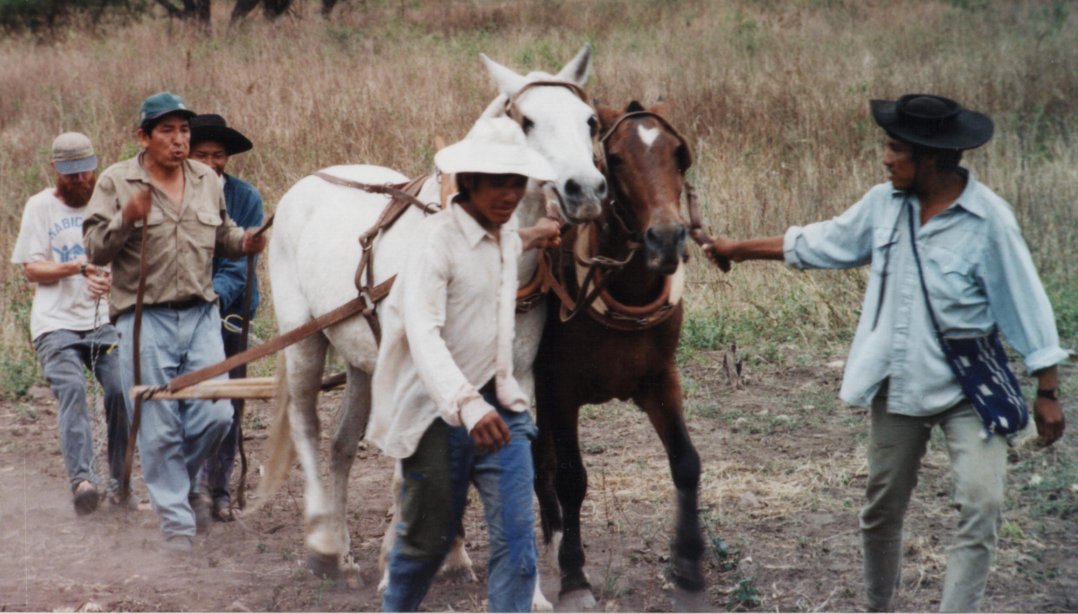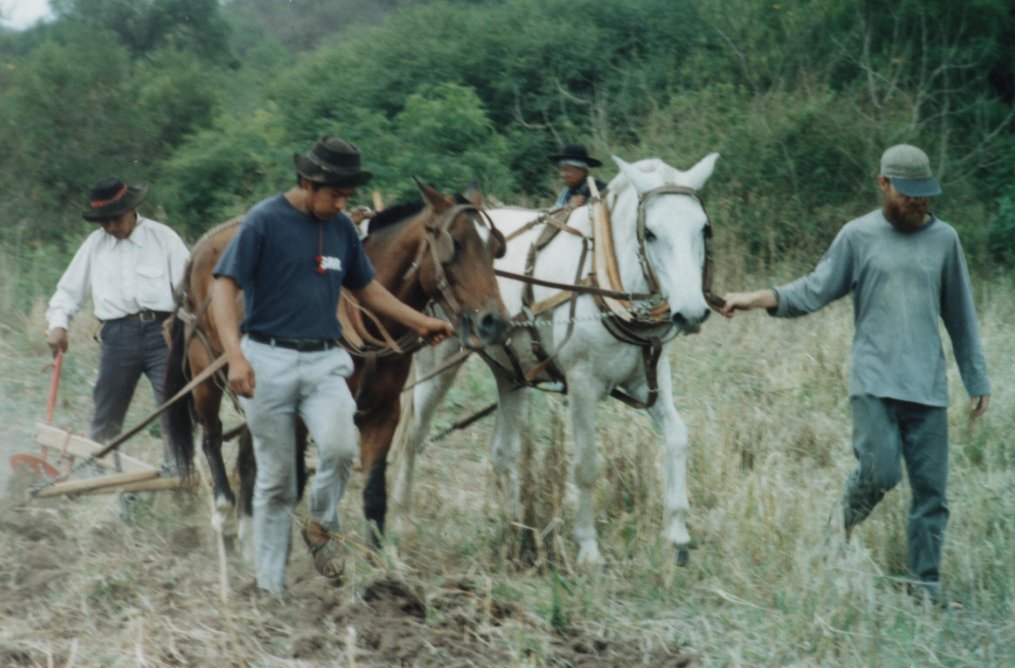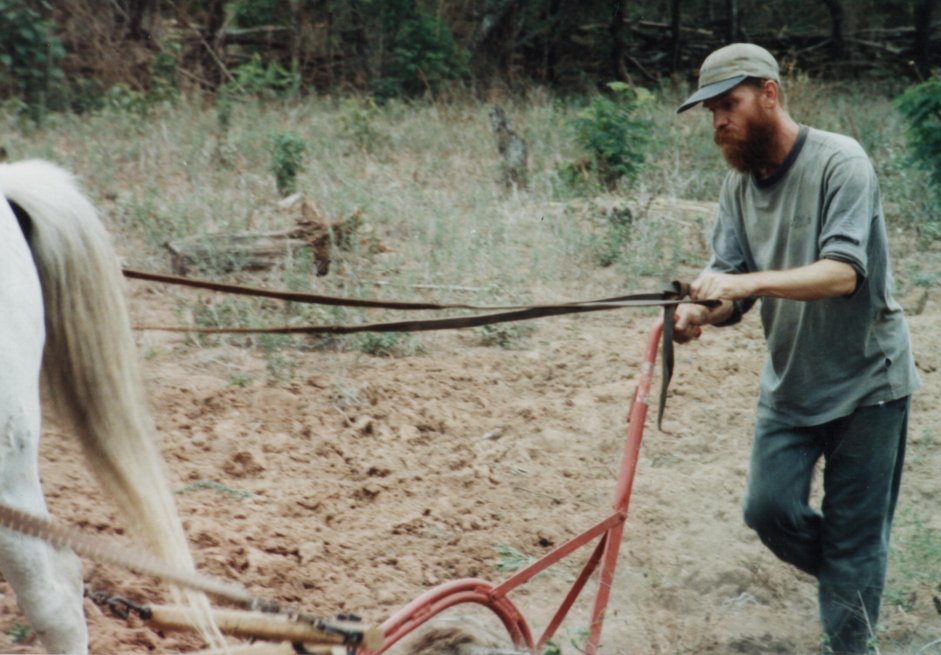Imi, Canton Rosario del Ingre
25 December 2000
Season’s Greetings to All.
It is the last Christmas of the millennium and I have no tree, no lights, no stocking (no chimney), no snow, no Robert J. Lertzima (no radio, no NPR). It was not reindeer that woke me at 5:30 this-morning but a particularly gloomy donkey. Outside in the yard gathered all manner of cringing dogs, ferocious kittens, goats, pigs, baby chicks, and an old moo-cow. In the midst of it all Doña Justina was breast-feeding little Jesenia, who is barely two months old and even newer to this community than I am. Mother and child, and laid them in a menagerie: who needs a tree?
For breakfast I dreamed of walnut granola with yogurt and maple syrup, and drank black coffee. Bolivia didn’t change much in the six years I was away: the same handsome diversity of geography and the same honorable, kind, and capable pueblo, undermined by the same myopic bourgeoisie and the same corrupt, ineffective government. I’d never visited the southeastern “Chaco” region where I now live, however, and it’s as if it were another country with the same name. I'm adjusting to two different cultures I wasn't even really aware of when I lived in La Paz: the “Chaqueños” and the Guaraní (bluntly, cowboys and indians). One completely new language, subtle changes in another, new values, new lifestyles, new customs. Same black coffee breakfast.

It has also been six years since my last general letter, which I wrote from the Adirondacks after hiking the Appalachian Trail. The following Spring I put 12,000 miles on my pickup interviewing for teaching positions, and wound up in my own area code. The foolish place that hired me was Darrow, a small boarding school in the Berkshire cow country of New York. Over the next four years, I taught Spanish, English, and all levels of high school Math, ran a dorm, coached lacrosse, and rebuilt several old cars with my students. Inbetween, I coordinated food at Flying Cloud a couple more summers, and earned an M.Ed. from Antioch New England (studenting is even more fun than teachering).
Darrow provides special attention for kids with LD, ADHD, behavior issues, lousy parents, creativity, high intelligence, and other impediments to high school success. It was a great environment for learning about teaching: pedagogically challenging, but balanced by small classes. I loved my students (except a few I couldn’t stand) and my colleagues (dido), and I loved preparing and sharing classes. However, the year I arrived the administration started working to “improve” the student body (read: they developed an admissions policy). For me, we lost focus in proportion to their success. Also, after five years stateside I was feeling the tug of Overseas Development. It was a hard decision, but I applied to a couple other organizations for work, once again, in the “two-thirds world”.
While waiting for a response, a miracle occurred. The husband of a fellow teacher offered me a job administering the network at Quoin, Inc., a software company in Cambridge. I still thought Unix was a term for overaged boy sopranos. It was, however, a singular and generous opportunity, not to be passed up for a petty lack of qualification. The learning curve was vertical; I screwed up constantly and it was often frustrating, but what an adventure! My rapacious capitalist bosses were consistently more patient and supportive than the Christians at Habitat or the cozy Darrow community (no mean feat). I learned an awful lot (nor just about computers) and was even a little sorry when the Mennonite Central Committee came through, promising to send me back to the heart of South America.
After centuries of skirmishing back and forth, the Bolivian army finally dispossessed the Guaraní indigenous of their terrain in 1892. Land Reform sixty years later did nothing to improve their lot. Propertyless, the Guaraní were reduced to a state of virtual slavery. This situation has not changed, in many haciendas, even today. Reports vary, but Villa Hermosa (now Imi) may have been one of the saddest communities of all until 1996. In that year Spain, of all places, funded its purchase for the “captives” who worked it. Since then, its twenty-five families have become alive and industrious. Their approach to taking charge of their land and their destiny is democratic, constructive, and inspiring. And I’m lucky enough to be a part of it.
For example, everyone works together at least two days per week in communal labor. This is sometimes property improvement, like building roads or roofing sheep pens, but more often it’s agricultural. A few weeks ago we put in the corn. In Imi, this means digging a hole with a heavy hoe, throwing in a few kernels of corn from a kind of codpiece seed-bag, and then covering it up lightly. Next, you take a step forward and repeat the process. Judging by eye, you try to get your rows straight, and 80cm apart. Six kilometers later, back and forth, you've done your part for the day. I can't keep up with my neighbors when they're working, and never finished more than three. My part came a week later, when I organized an experimental peanut-planting with the community, to test five local varieties for the best yield and quality.

The weather is gorgeous today: warm, pure blue sky, pleasant breeze. It’s too bad I want rain. Although my purpose here is to hang out, my excuse is promoting animal traction. Again, a year ago I might have thought it involved huge plaster casts and counter-weights. No: we've brought in a couple of horses we use for plowing and pulling a wagon. I’ve been wanting to plow a small plot for over a week, but the soil has become too dry and hard. This-morning, while many of you were opening presents, I gave it another desperate try. Unfortunately, the plow hydrofoiled unless I pushed down on it really hard, and whenever I did the horses quit. After a thorn went in the bottom of my toe and out the top, I quit too. In humid soil the plow is sweet, especially compared to six kilometers with a hoe.
In October Doña Justina declared I was working too hard. She said I was too thin. For two weeks she made sure I ate more every day than the horses. (Unlike the horses, who fill out their corn diet with grass, Imeños mostly just eat corn. On the other hand, they have a bewildering variety of ways to prepare it, and I don’t think Justina has ever given me the same meal twice.) She still feeds me occasionally, out of the goodness of her heart, if I look tired or sun-beaten. Meanwhile, her husband, Don Ernesto, has been teaching me the details of existence in the Cañon del Ingre: how to sharpen a machete, collect hay for adobes, what will grow, how to make a hoe handle. Don Angel has been teaching me village structure, and Don Claudio tells me about wider Guaraní politics.
A year ago I was working for a software company in Cambridge, where my main tools were Emacs and vi. Now, on the eve of the third millennium, I’m growing peanuts and corn in Bolivia, where my main tools are a team of horses and a machete. My job is to “accompany” this community, but the women fuss about my health and the guys spend their days “building my capacities”. I traveled five thousand miles to work with people victimized by prejudice, deprived of education, and poor even by Bolivian standards, only to find them confidently facing the future. And despite braying donkeys, baffling languages, impaling thorns, and missing many family and friends on Christmas day, I wouldn't rather be anywhere else.
Have a happy new year, a great decade, a terrific century, and a wonderful millennium.
./James (Phineas)
James Gosselink
Comité Central Menonita
Casilla 213, Santa Cruz BOLIVIA

PS: The accompanying pictures were taken during a course to train both the horses and ourselves. This is why they are crowded. Normally, only one person works the team at a time, as in the third shot.